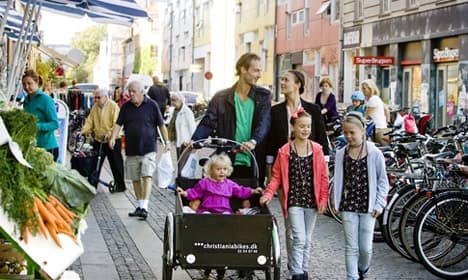'The Danish way' trumps the American dream

The American author of a new book about Danish parenting writes that the Danes' focus on empathy makes them much happier than Americans who pursue material goods.
I used to undervalue the importance of empathy until I married a Dane. Through my many years living among people voted as the happiest in the world, I have to say that I learned some valuable life lessons. One of the most important being that “empathy” is a far better predictor of wellbeing than the American dream.
My first understanding of how America is viewed from afar was when I left to live abroad many years ago. That was when I began to question what our core values actually were. Partly because people asked me and partly because every country had their own idea of “success”, which tended to be starkly different than our own. Sure, we were the land of the free and the home of the brave, and then there was the pursuit of happiness and the American dream. But what was that American dream again?
Being pressured for an answer one day by a tall Danish man named Odd (not kidding), I conjured up the image of a white picket fence, a really large house, and an SUV in the driveway. “Ok, but what if you take away the big house and the SUV?” he asked. “And replaced it with what?” I responded. “A small house, no car and a happy family?” I laughed “Oh , that’s really sweet and everything, but it isn’t the American dream.”
His question got me wondering though: what was it about the American dream that appealed to so many? What was it that really defined success from coast to coast for a large part of the American population? The more I thought about it, the more I kept coming back to the same answer: money.
The American dream, as I could work it out, was predominantly about having things. It didn’t really involve caring about the wellbeing of others as they did in Denmark. Of course relationships were important to an American, and being a nice person was always a plus, but let’s face it: having a good relationship with your sister or your co-workers wasn’t really what separated the men from the boys, although a few million bucks in the bank might.
Actually, the more I thought about it, the more it became clear that it didn’t seem to matter who you were or what you stood for. You could be a gunshot-riddled rapper, a selfie-obsessed airhead or a thieving broker on Wall Street – the common denominator for the right answer to successfully pursuing happiness seemed to be material wealth.
And how was that happiness-pursuing working out for us? According to the National Center of Health Statistics, the level of anti-depressant use went up 400 percent between 2005 and 2008 alone. Meanwhile, empathy levels dropped almost 50 percent and narcissism increased two-fold since the 1980-1990’s. Could our declining empathy level and increasing narcissism be part of the reason for scoring number 17 in the World Happiness Report, below Mexico?
Iben Sandahl, a respected Danish psychotherapist, and I ask these questions and more in our new book The Danish Way of Parenting, in which we uncover the real reason for the Danes’ happiness. It is, quite simply, in their upbringing. Happy parents raise happy children who become happy parents and so on. And one important life lesson for Danish children is how to be empathic.
In Denmark, for example, teaching empathy to children is seen as just as important as teaching maths or English.
“Helping them to understand the importance of caring for others is part of making ‘the whole child’, not just encouraging academics” Sandahl says.
Seeing as the quality of our relationships is a far better predictor of contentment than wealth, is it any wonder that a country that fosters empathy early on is number one in some many happiness reports?
Already from preschool age, Danish kids are taught empathy skills. In one program called Step by Step students are shown pictures of faces exhibiting different emotions: sadness, fear, anger, frustration, etc. They talk about these cards and put into words what the child is sensing and learn how to conceptualize their own and others’ feelings. This is one of many examples of the ways in which Danes learn compassion early on, which automatically makes them better at it as adults.
Empathy is now considered one of the single biggest factors in making successful leaders, entrepreneurs, managers and businesses. It reduces bullying and increases our capacity to forgive and greatly improves relationships.
From my own experience with The Danish Way, I have improved my relationship with my family, become a better manager, wife and mother. And one thing I am sure of: it brings me a lot more happiness than having an SUV in the driveway. Our hope with the book is that more people can wake up from the American dream and smell the coffee… it might just be a Danish brand.
- Jessica Alexander
Comments
See Also
I used to undervalue the importance of empathy until I married a Dane. Through my many years living among people voted as the happiest in the world, I have to say that I learned some valuable life lessons. One of the most important being that “empathy” is a far better predictor of wellbeing than the American dream.
My first understanding of how America is viewed from afar was when I left to live abroad many years ago. That was when I began to question what our core values actually were. Partly because people asked me and partly because every country had their own idea of “success”, which tended to be starkly different than our own. Sure, we were the land of the free and the home of the brave, and then there was the pursuit of happiness and the American dream. But what was that American dream again?
Being pressured for an answer one day by a tall Danish man named Odd (not kidding), I conjured up the image of a white picket fence, a really large house, and an SUV in the driveway. “Ok, but what if you take away the big house and the SUV?” he asked. “And replaced it with what?” I responded. “A small house, no car and a happy family?” I laughed “Oh , that’s really sweet and everything, but it isn’t the American dream.”
His question got me wondering though: what was it about the American dream that appealed to so many? What was it that really defined success from coast to coast for a large part of the American population? The more I thought about it, the more I kept coming back to the same answer: money.
The American dream, as I could work it out, was predominantly about having things. It didn’t really involve caring about the wellbeing of others as they did in Denmark. Of course relationships were important to an American, and being a nice person was always a plus, but let’s face it: having a good relationship with your sister or your co-workers wasn’t really what separated the men from the boys, although a few million bucks in the bank might.
Actually, the more I thought about it, the more it became clear that it didn’t seem to matter who you were or what you stood for. You could be a gunshot-riddled rapper, a selfie-obsessed airhead or a thieving broker on Wall Street – the common denominator for the right answer to successfully pursuing happiness seemed to be material wealth.
And how was that happiness-pursuing working out for us? According to the National Center of Health Statistics, the level of anti-depressant use went up 400 percent between 2005 and 2008 alone. Meanwhile, empathy levels dropped almost 50 percent and narcissism increased two-fold since the 1980-1990’s. Could our declining empathy level and increasing narcissism be part of the reason for scoring number 17 in the World Happiness Report, below Mexico?
Iben Sandahl, a respected Danish psychotherapist, and I ask these questions and more in our new book The Danish Way of Parenting, in which we uncover the real reason for the Danes’ happiness. It is, quite simply, in their upbringing. Happy parents raise happy children who become happy parents and so on. And one important life lesson for Danish children is how to be empathic.
In Denmark, for example, teaching empathy to children is seen as just as important as teaching maths or English.
“Helping them to understand the importance of caring for others is part of making ‘the whole child’, not just encouraging academics” Sandahl says.
Seeing as the quality of our relationships is a far better predictor of contentment than wealth, is it any wonder that a country that fosters empathy early on is number one in some many happiness reports?
Already from preschool age, Danish kids are taught empathy skills. In one program called Step by Step students are shown pictures of faces exhibiting different emotions: sadness, fear, anger, frustration, etc. They talk about these cards and put into words what the child is sensing and learn how to conceptualize their own and others’ feelings. This is one of many examples of the ways in which Danes learn compassion early on, which automatically makes them better at it as adults.
Empathy is now considered one of the single biggest factors in making successful leaders, entrepreneurs, managers and businesses. It reduces bullying and increases our capacity to forgive and greatly improves relationships.
From my own experience with The Danish Way, I have improved my relationship with my family, become a better manager, wife and mother. And one thing I am sure of: it brings me a lot more happiness than having an SUV in the driveway. Our hope with the book is that more people can wake up from the American dream and smell the coffee… it might just be a Danish brand.
- Jessica Alexander
 Jessica Alexander is the co-author of the new book The Danish Way of Parenting, written with
Jessica Alexander is the co-author of the new book The Danish Way of Parenting, written with
Join the conversation in our comments section below. Share your own views and experience and if you have a question or suggestion for our journalists then email us at [email protected].
Please keep comments civil, constructive and on topic – and make sure to read our terms of use before getting involved.
Please log in here to leave a comment.